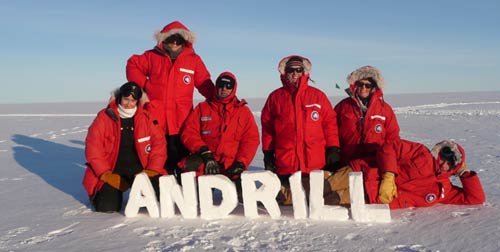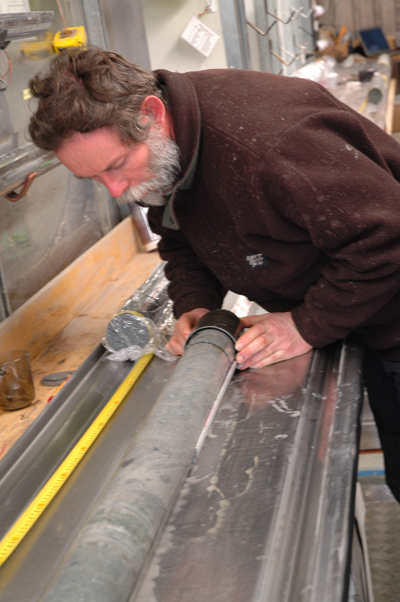Hmmm. Sounds suspiciously plausible. But I can't deter them. They plunge on day and night raising doubts about data sets, spotting conflicting evidence, framing new questions, outlining differing interpretations of core sections -- and that's when they're not talking football. This being an international gathering, they naturally have two kinds of football to talk. And then there's the joking and joshing. These guys actually have a sense of humor.
You've heard about the two chocolate Easter bunnies? Nevermind...
I'm starting to wonder if these are real scientists. Everyone knows that real scientists are humorless nerds outfitted in lab coats and thick glasses, right?
Uh, not exactly. These guys are ice-trucker tough -- they've lived and worked on the coldest continent in the world and can curse in at least three languages. They are also damn smart and highly inquisitive. Listen to John Coleman, and you might expect them to whip out Chairman Al's Little Red Book of Global Warming and recite chapter and verse.
But, dammit, these guys refuse to conform to stereotype. Rather than just declare that global warming is a scientific fact, they are working their way inch by inch through miles of data. The data are in two mile-deep Antarctic cores they have drilled, recovered, and examined over the past four years. Clues abound in the samples, but it takes researchers of many different specialties to spot them.
To me, the ANDRILL cores look like tubes of mud and cement. But these scientists have developed myriad methods of deducing the presence or absence of ice from the record.
A few examples: they measure the grain size of sediment in each sample. Water moves sand. Ice shifts rocks. So, if you've got all sand in your sample, you can infer that it was probably warm. If you've got a lotta rocks, it was cold. That's just one indicator. They also look for pollen. That tells you if there were plants flowering nearby. They examine the diatoms in the sample. That helps them date the sample, but it also tells them something about the water temperature. They log magnetic mineral content. They check for the presence of organic molecules left over from ancient microorganisms whose presence or absence, again, tells them about temperature. They compare all this with measurements of oxygen isotopes that other scientists have retrieved from microfossils. The relative amounts light and heavy oxygen tells about how much was locked up in ice, and so constitute yet another temperature indicator.
If this is a hoax, scientists are going to ridiculous lengths to establish it. Not only are they weaving together many different lines of evidence, they are actually looking for gaps, knots, and mismatches in the tapestry -- places where the evidence is missing, clashes, or fails to meet expectations. And there are some. That's what makes it so easy for global-warming deniers to pounce. But these scientists seem oddly uninterested in formulating propaganda. Instead, they are struggling to filter out noise, to spot authentic signals, and to test their interpretations against one another before putting together a coherent story.
They aim to tell the climate history of Antarctic over the past 20 million years and explain what it may mean for the world today. This matters, because the world's largest ice sheets lie atop the southernmost continent. They are more than a mile thick. There is more fresh water locked up in the Antarctic ice sheets than in all of the Great Lakes put together. Enough that, if they were to melt, the global sea level would rise by as much as 200 feet (60 meters).
It had been thought that, because they sit on dry land, the Antarctic ice sheets were fairly stable. But NASA satellite images show that they are losing hundred of billions of tons of ice a year. So how likely is it that the ice sheets will collapse?
Over the next few days, ANDRILL scientists hope to weave together the many threads of evidence about the past. This won't necessarily tell us what's going to happen in the next few centuries. It certainly won't answer every question about global warming. But it will give us a higher resolution climate history. And better yet, it will furnish climate scientists with more questions.
Think about that. Global warming deniers have no questions. None at all. They have nothing but smug certainties. But in the hands of inquisitive scientists, a few good questions could outweigh a ton of coal, man.
Full Disclosure: My basic travel expenses are being paid by the ANDRILL project so that I can cover the conference.
